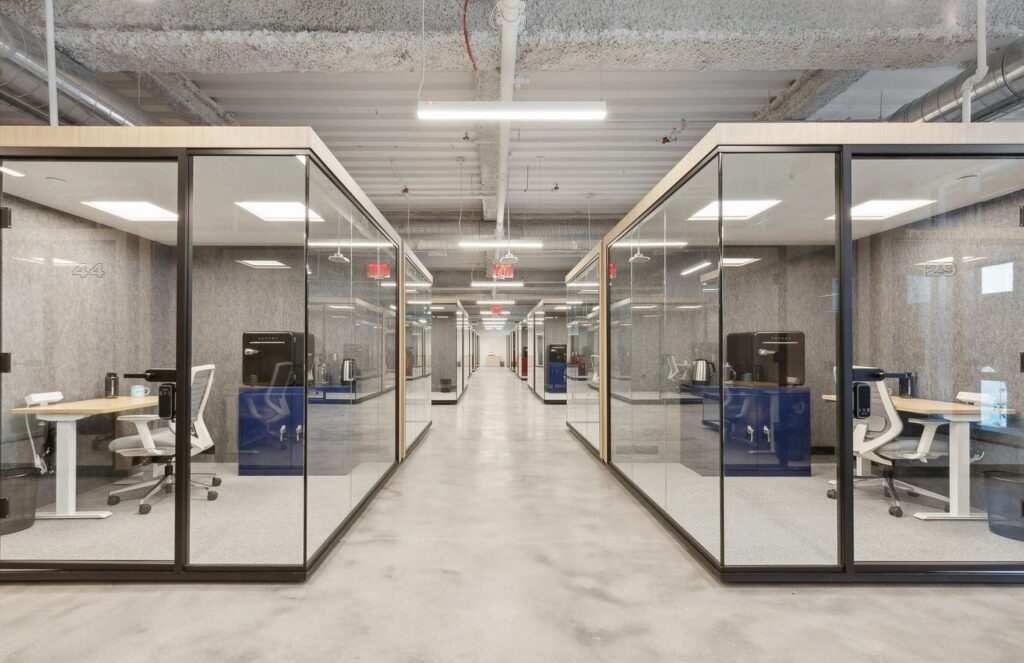A European office pods maker expanding into the U.S. raised a new round of funding, signaling confidence that a trend in using privacy pods will accelerate.
Belgium-based JUUNOO raised $6.6 million from existing investors to expand the business beyond office and coworking uses for its office pod products. The company said the additional money will allow it to reach into such sectors as education, healthcare and hospitality.
JUUNOO’s additional funding puts the company more firmly in a growing trend in “office peacocking,” a new moniker of unknown origin for fancying up office space to entice employees back to the office in the post-COVID-19 world.
The company makes modular pods that can be snapped together and taken apart for use elsewhere. “That’s the core element,” Chris Van de Voorde, JUUNOO’s founder and chief executive officer, says.
JUUNO’s investors include Saint Gobain, Belgium’s sovereign wealth fund SFPIM, Belgian venture fund FINIDUS and part of the management team, according to the company.
The funding comes on the heels of partnerships with Two Trees Management, which is redeveloping the former Domino Sugar refinery in Brooklyn, New York; Framework, the coworking arm of Brooklyn apartment builder Frame Home; coworking firm Industrious; and consulting firm Deloitte.
The company recently teamed with Framework to put pods into coworking space inside Domino Sugar Refinery. The old factory is in a Brooklyn neighborhood known as Dumbo, an acronym for down under the Manhattan Bridge overpass.
Office Pods Trended Before COVID-19
Office pods were surging in use before the pandemic as companies spruced up offices with cafes, huddle rooms, game rooms, modern furniture and colorful decor to create a more collaborative environment.
But the design wasn’t dubbed “office peacocking” then. Still, a goal was to attract and retain employees.
But collaboration wasn’t happening the way companies thought. Employees donned headphones. Employees wanted some privacy in doing their work.
“Although the open-office design is intended to encourage us to interact face-to-face, it gives us permission not to,” Harvard University business professor Ethan Bernstein and MIT visiting researcher Ben Waber wrote in a 2019 Harvard Business Review article.
Bernstein and Waber weren’t dismissive of the open design but noted that figuring out the right balance to encourage productive collaboration is challenging and that a “single best physical or digital workspace architecture will never be found.”
Office pods became a solution for privacy. Major companies such as Nvidia, Microsoft, Boeing, Starbucks, Netflix, Apple, Lockheed Martin, Google and Tesla added pods to their office space.
They first looked like phone booths but now come in many sizes.
A slew of pod makers emerged – Thinktanks, Room, Zenbooth, TalkBox, SnapCab and others.
Finnish company Framery, considered the inventor of the office pod, expanded into the U.S. Vetrospace, another Finnish company, launched in 2017 and has been expanding into the U.S. market.
They are all competitors but no one firm dominates the business. And some specialize.
“We make very large pods,” says Markku Lento, Vetrospace USA’s chief executive officer. “We also customize them heavily.”
The pandemic happened and shut down offices, sending employees to work remotely. Companies believed it would be a short period. Instead, it turned into more than a year.
Companies faced pushback when they tried bringing employees back into the office. Hybrid work models arose to create a balance between in the office and working from home.
Office pods have become an increasingly popular addition as companies intensify the pre-Covid-19 design trend, now called “office peacocking,” to lure back employees back with a swanky office.
Building Sustainable Office Pods
Van de Voorde founded JUUNOO in 2017 to make sustainable offices pods that are better for the environment. His goal is to accelerate the world’s transition to circular building methods which involves reusing materials for as long as they are useful.
The linear method involves using materials that later end up in a landfill.
ROCO, a company building tunnels under Antwerp, Belgium, is an example of the circular value initiative Van de Voorde is promoting. JUUNOO provided ROCO with pods to create temporary offices while the company works the $7.6 billion project scheduled for completion in 2030.
Once the project is completed, Van de Voorde says his company will buy back the pods at a discount to the price ROCO initially paid and then reuse the materials like Lego blocks.
Van de Voorde took a further step in February by founding the Circular Value Institute with support from Europe-based Circular Building Coalition to help raise global awareness for sustainable construction methods.
Office pods help in circular value by replacing the need for drywall throughout an office, Van de Voorde says. But the challenge is pods aren’t cost-effective enough on scale to replace all drywall use in an office space.
“It’s my mission to replace all the drywall in the world,” Van de Voorde says.
French company Saint-Gobain, one of the world’s largest drywall manufacturers, has leaned into the circular economy.
“With 32% of (carbon dioxide) emissions from the built environment, we really need to break away from that linear model of discarded waste to landfill,” Dennis Wilson, vice president for environmental, social, and governance for Saint-Gobain North America, said in a July video.
Read the full article here

